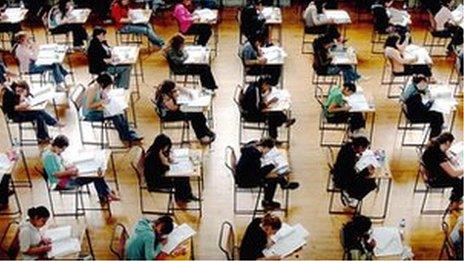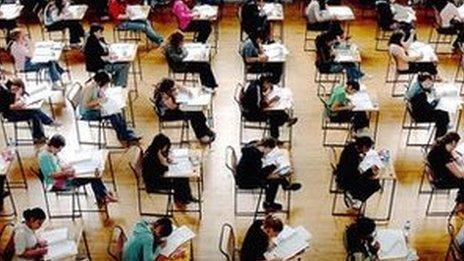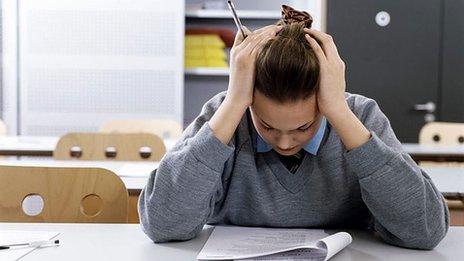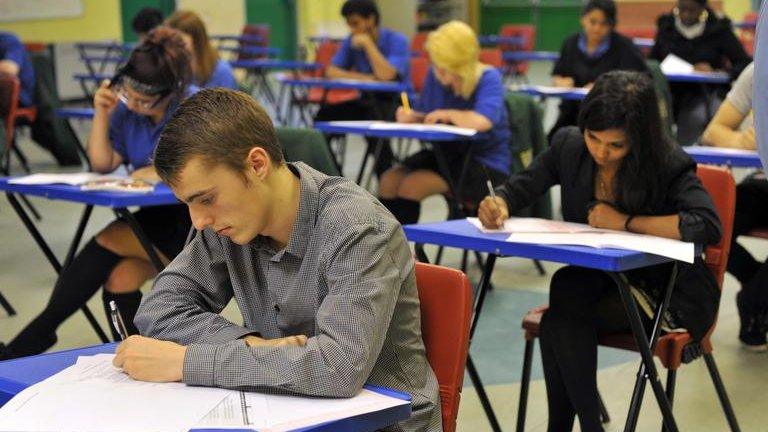GCSE shake-up: Ultra-high grade for top performers
- Published
- comments
Ofqual's Glenys Stacey wanted the public to consider whether a top grade was ''really awarded to students who performed exceptionally well''
A new top-level GCSE grade will be awarded to the most talented 20,000 pupils each year, in proposals for a shake-up of England's exam grades.
The Ofqual exam regulator has launched a consultation on a grading system that will rank from nine at the very top down to one for the lowest performers.
The changes, to be introduced from 2017, will also link exam grades to international Pisa tests.
Ofqual's Glenys Stacey says it will improve the "calibration" of exams.
But head teachers leaders suggested there were still "parts of the puzzle missing".
The substantial changes, being put out for consultation, would provide a much clearer distinction between high-flying pupils currently achieving A and A* grades.
The highest grade - to be described as a grade nine - will be awarded to only half the pupils now achieving an A*, according to Ofqual's proposals.
International benchmarks
In last summer's GCSE exams, there were 6.8% of pupils graded as A*. The new highest grade would be awarded to only the top 3%, or about 20,000 pupils.
Under the new system, an A grade would equate to a grade seven - and the current C grade, widely seen as the pass level, would become a grade four.
For the first time, there will be a link between England's exam grades and international benchmarks.
The results of Pisa tests in competitor countries, which have become an influential measure for international comparisons, will be used to establish grade five.
It will be expected to be set at about half or two-thirds of a grade higher than the current grade C.
And it remains to be decided whether grade four or grade five will become the expected level in future, for measures such as school league tables and minimum standards for schools.
A sample of pupils will also take a new test - the National Reference Test - which will be used to monitor the performance of each cohort, so that examiners will have a reference point for differences in ability between different year groups.
These changes will begin with three subjects - maths, English language and English literature.
These will be the first wave of tougher GCSEs, to be taught from September 2015, with the first awards under the proposed new system in summer 2017.
Other subjects are planned to follow, including history, geography and some sciences.
'Greater accuracy'
If adopted, the proposed changes would mean that GCSEs in England would have a different grading system and structure from GCSEs in Wales and Northern Ireland, extending the differences between the systems.
Ofqual chief Glenys Stacey says the changes are intended to "strengthen awarding" and to give greater accuracy in grades.
Russell Hobby, leader of the National Association of Head Teachers, "broadly welcomed" the proposals and hoped the consultation would help to address some of the "discontent" over marking and grades.
But a high-performing independent school rejected the plans - and said it would be more likely to make them switch to International GCSEs.
"For years governments of different political complexions have mistakenly tried to use GCSE qualifications as a measure of both a young person's learning and a school's performance," said Helen Stringer, vice-principal of the Stephen Perse Foundation school in Cambridge.
"This current proposal simply aims to extend this flawed system so that the qualification also has to become a measure of the quality of the national education system."
Brian Lightman, general secretary of the Association for School and College Leaders, said there were still "parts of the puzzle" missing in how the new system would work.
"Until it is made clear to teachers what students need to know in order to achieve a grade, and they have detailed specifications and sample questions, they will not be able to plan for these examinations.
"While we understand the government's wish to raise the bar by aligning some grades to Pisa, this raises all kinds of issues. Pisa is a completely different kind of exam than the new GCSEs.
"We welcome the proposal to introduce a reference test, which will help to make an objective judgement about whether standards have improved or not year or year. The careful consideration being given to different ways of awarding grades is also welcome."
Chris Keates, leader of the Nasuwt teachers' union, warned that: "Schools, parents and pupils are being thrown into further confusion over yet more reform to the qualifications system."
- Published3 April 2014
- Published1 November 2013

- Published11 March 2014

- Published25 March 2014

- Published6 September 2013
